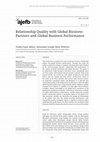Papers by Teuku Fajar Akbar

This study aims to analyze the interconnection between relationship quality and global business p... more This study aims to analyze the interconnection between relationship quality and global business performance. Through this study, the authors expected to obtain a complete and integrated understanding of the interconnection between relationship and performance in the context of global marketing and global business. This paper is an exploratory study through a literature review. Specifically, there are three major international journal articles reviewed. These three journal articles are written by Ural (2009), Drenkovska and Redek (2015), and Lin, Huang and Peng (2014). Furthermore, based on the study of the three journals and several other journal articles, an integrated conceptual model was designed. It is detected that relationship quality at the global level can directly or indirectly affect global business performance. Regarding the indirect influence, quality of global level relations is capable to at least affect three mediator variables, namely; knowledge at the global level, ...

12th GLOBAL CONFERENCE ON BUSINESS AND SOCIAL SCIENCES
The business environment is undergoing dynamic changes such as the increased competition and the ... more The business environment is undergoing dynamic changes such as the increased competition and the development of new technologies. Companies have been increasingly interested in improving their business performance. In the literature on B2B markets there is a high-level agreement that principal's performance can be improved towards holding fewer and closer relationships. Increasing long term relationships represents a starting point for competitive advantage. Research and practice on marketing channel management have proven the importance of managing relationships between people or organizations which is carry out the distribution function (Stern, Louis W and Weitz, 1997). A value has always been the fundamental basis for all marketing activities (Palmatier, 2008). In fact, it is essential to know how to create and deliver value in the relationship, from both point of view, the manufacturer and retailer (Ulaga and Eggert, 2005). The main objective of this research is to obtain a ...

Jurnal Dinamika Manajemen
This study aims to answer the effectiveness of EEP toward entrepreneurial preference in Indonesia... more This study aims to answer the effectiveness of EEP toward entrepreneurial preference in Indonesia. Entrepreneurship Education Program (EEP) has become one of the main instruments of growth of many governments around the world, including the Indonesian government. Nevertheless, polemics and debates have arisen in Indonesia regarding its implementation effectiveness. Through this study, we also emphasize the utilization of family (parents’) work background to understand the effectiveness of EEP further. Surveys among university students were conducted in this research, particularly to those who were exposed to EEP during their studies. By using the Theory of Planned Behavior (TPB), the findings conveyed that EEP is indeed effective and in line with students’ entrepreneurial preferences. Of the three factors, only subjective norms have a contradicting relationship. Similar results occur using family work background, i.e., families with entrepreneurial-work backgrounds and families who...

Indonesian Journal of Business and Entrepreneurship
This study aimed to provide an understanding and evaluating the implementation of entrepreneurshi... more This study aimed to provide an understanding and evaluating the implementation of entrepreneurship education as a mandatory program in Indonesia. The study emphasizes the measurement of the effectiveness of different entrepreneurship education programs in higher education implementation, intracurricular and cocurricular programs. The study used the Theory of Planned Behavior (TPB) to measure students' entrepreneurial intentions. The objects of the research were students who participated in the entrepreneurship programs. The study used quantitative approach and purposive sampling as the sampling technique. The survey resulted in 304 valid respondents from ten universities in Indonesia. The findings showed that intracurricular-based entrepreneurship education was unable to give a significant emphasis on students' entrepreneurial intention. In contrast, cocurricular-based entrepreneurship education was able to give a significant emphasis on students' entrepreneurial intention and emphasized on attitude as a single factor.

Uploads
Papers by Teuku Fajar Akbar